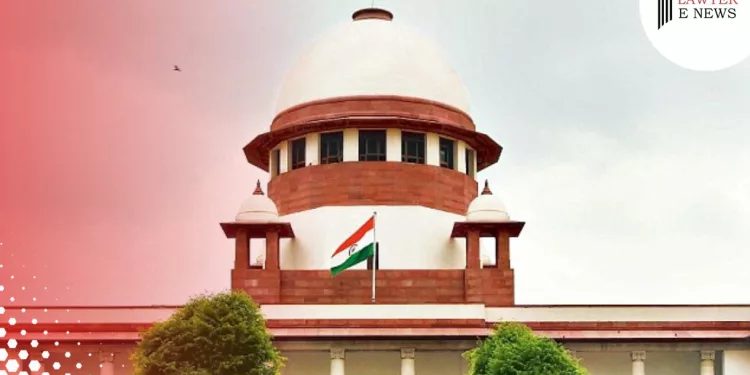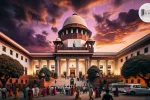Urgent Need for Judicial Reform: Issued Directions For Speedy Disposal of Civil Suits: Supreme Court

In a groundbreaking verdict delivered on October 20, 2023, by a bench comprising Justices S. Ravindra Bhat and Aravind Kumar, the Indian judiciary system has come under the spotlight as the Honorable Supreme Court addresses the pressing issue of delay and pendency of cases. The judgment emphasizes the significance of a swift and efficient judiciary, recognizing it as a cornerstone of democracy, a bulwark against tyranny, and the guarantor of individual liberties. Supreme Court Stated,” if we consider the stage-wise pendency, it is revealed that majority of the pendency in cases is at the Evidence/ Argument/ Judgement stage (43,22,478), within which the maximum pendency is caused at the stage of hearing and evidence. High pendency is also caused during the Appearance/Service stage (27,03,493), within which the maximum pendency is appearance and service/summons related. The reasons behind the maximum pendency as stated by the NJDC has been ruled to be matters which are stayed (9,69,262) unattended (8,31,076) and awaiting records (8,219,929).”
The verdict underlines the responsibility of citizens under Article 51A(j) of the Constitution, urging them to strive for excellence in all spheres of individual and collective activity. It calls for a concerted effort from all stakeholders, including the legal fraternity, legislature, executive, and citizens, to join hands in a united push for judicial reform.
The judgment examines the historical context of the issue, citing a prolonged legal case that spans several decades, highlighting the disillusionment of litigants due to the slow pace of judicial processes. It emphasizes the critical distinction between ‘legal representative’ and ‘legal heir’ under the Code of Civil Procedure, underscoring the importance of having the correct legal representative on record to prosecute proceedings after a party’s demise.
Delving into the reasons behind judicial delays, the verdict points out factors contributing to delay in civil trials, including non-compliance with CPC provisions, misuse of court processes, lengthy evidence and arguments, and non-utilization of CPC provisions such as Order X. It criticizes the over-tolerant approach of lower courts in granting adjournments, causing unwarranted delays.
The judgment also advocates for the strict enforcement of time schedules, especially regarding the filing of written statements under Order VIII, Rule 1, and introduces the concept of Case Flow Management System Rules for High Courts and Subordinate Courts to address delays in litigation.
Alarming statistics on the pendency of cases before High Courts and Civil Courts in various states are presented, emphasizing the magnitude of the problem of judicial delay. It calls upon all stakeholders to streamline procedures, bolster infrastructure, invest in technology, and empower the judiciary to meet the demands of the time.
The verdict concludes with a series of directives to lower courts, including ensuring the proper execution of summons, timely filing of written statements, recording of admissions and denials, and promoting alternative dispute resolution (ADR). It emphasizes the importance of maintaining trial diaries, complying with provisions for the payment of costs, and expediting the trial process. Monitoring and reporting requirements for pending cases, especially those older than five years, are established, along with the creation of review committees by High Courts to oversee corrective measures.
Supreme Court Issued the following directions:
- All courts at district and taluka levels shall ensure proper execution of the summons and in a time bound manner as prescribed under Order V Rule (2) of CPC and same shall be monitored by Principal District Judges and after collating the statistics they shall forward the same to be placed before the committee constituted by the High Court for its consideration and monitoring.
- All courts at District and Taluka level shall ensure that written statement is filed within the prescribed limit namely as prescribed under Order VIII Rule 1 and preferably within 30 days and to assign reasons in writing as to why the time limit is being extended beyond 30 days as indicated under proviso to sub-Rule (1) of Order VIII of CPC.
iii. All courts at Districts and Talukas shall ensure after the pleadings are complete, the parties should be called upon to appear on the day fixed as indicated in Order X and record the admissions and denials and the court shall direct the parties to the suit to opt for either mode of the settlement outside the court as specified in sub-Section (1) of Section 89 and at the option of the parties shall fix the date of appearance before such forum or authority and in the event of the parties opting to any one of the modes of settlement directions be issued to appear on the date, time and venue fixed and the parties shall so appear before such authority/forum without any further notice at such designated place and time and it shall also be made clear in the reference order that trial is fixed beyond the period of two months making it clear that in the event of ADR not being fruitful, the trial would commence on the next day so fixed and would proceed on day-to-day basis.
- In the event of the party’s failure to opt for ADR namely resolution of dispute as prescribed under Section 89(1) the court should frame the issues for its determination within one week preferably, in the open court.
- Fixing of the date of trial shall be in consultation with the learned advocates appearing for the parties to enable them to adjust their calendar. Once the date of trial is fixed, the trial should proceed accordingly to the extent possible, on day-to-day basis.
- Learned trial judges of District and Taluka Courts shall as far as possible maintain the diary for ensuring that only such number of cases as can be handled on any given day for trial and complete the recording of evidence so as to avoid overcrowding of the cases and as a sequence of it would result in adjournment being sought and thereby preventing any inconvenience being caused to the stakeholders.
vii. The counsels representing the parties may be enlightened of the provisions of Order XI and Order XII so as to narrow down the scope of dispute and it would be also the onerous responsibility of the Bar Associations and Bar Councils to have periodical refresher courses and preferably by virtual mode.
viii. The trial courts shall scrupulously, meticulously and without fail comply with the provisions of Rule 1 of Order XVII and once the trial has commenced it shall be proceeded from day to day as contemplated under the proviso to Rule (2).
- The courts shall give meaningful effect to the provisions for payment of cost for ensuring that no adjournment is sought for procrastination of the litigation and the opposite party is suitably compensated in the event of such adjournment is being granted.
- At conclusion of trial the oral arguments shall be heard immediately and continuously and judgment be pronounced within the period stipulated under Order XX of CPC.
- The statistics relating to the cases pending in each court beyond 5 years shall be forwarded by every presiding officer to the Principal District Judge once in a month who (Principal District Judge/District Judge) shall collate the same and forward it to the review committee constituted by the respective High Courts for enabling it to take further steps.
xii. The Committee so constituted by the Hon’ble Chief Justice of the respective States shall meet at least once in two months and direct such corrective measures to be taken by concerned court as deemed fit and shall also monitor the old cases (preferably which are pending for more than 05 years) constantly.
This landmark judgment is a clarion call for reform, and its impact on the Indian judiciary system is expected to be profound. As the nation grapples with the challenge of judicial delay, the legacy of this judgment may well shape the destiny of the nation and restore the faith of its citizens in the promise of a just and equitable society.
Date of Decision: October 20, 2023
Yashpal Jain vs Sushila Devi & Others






